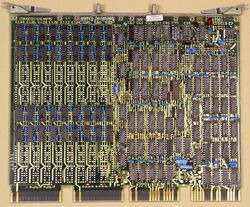Difference between revisions of "MSV11-P MOS Random-Access Memory"
m (→External links: +manual, FMPS) |
m (→Further reading: +Differences Between MSVI1-L and MSV11-P Memories) |
||
| Line 75: | Line 75: | ||
The following 256K DRAM chips have been observed to be used: MB81256-15 (Fujitsu). M5K4164ANP-15P (Micron Technologies), NEC D4164C211 (NEC Electronics). HM50256-15 (Hitachi), TMS4256-15NL (Texas Instruments) | The following 256K DRAM chips have been observed to be used: MB81256-15 (Fujitsu). M5K4164ANP-15P (Micron Technologies), NEC D4164C211 (NEC Electronics). HM50256-15 (Hitachi), TMS4256-15NL (Texas Instruments) | ||
Note that some of these parts are 120 nsec parts, while others are 150 nsec; the faster parts do not seem to be necessary, or give any advantage. --> | Note that some of these parts are 120 nsec parts, while others are 150 nsec; the faster parts do not seem to be necessary, or give any advantage. --> | ||
| + | |||
| + | ==Further reading== | ||
| + | |||
| + | * ''Differences Between MSVI1-L and MSV11-P Memories'', [[MicroNote]] #111 | ||
==External links== | ==External links== | ||
Latest revision as of 21:36, 25 July 2024
The MSV11-P (M8067) is a quad-height QBUS DRAM main memory card. The MSV11-PL (M8067-Lx) holds 512 KBytes when fully populated with 64K DRAMs chips, the MSV11-PK (M8067-Kx) is half-populated (the only partially-filled configuration allowed) and holds 256 Kbytes. (The 'x' in the board identifier is a capital letter which identifies the manufacturer of the DRAM chips.)
The memory is arranged as 2 banks, each 16 data bits (1 PDP-11 word) wide, with 2 additional bits for parity (1 per byte). It can be configured as either a Q18 card, or a Q22 card; the -PL must be configured as a Q22 card due to its size. It can also be configured for use either in a Q/CD backplane or a Q/Q backplane. .
Configuration
The card is configured by jumpers on wire-wrap posts; it is possible to set:
- the starting address;
- the size (256KB or 512KB);
- the CSR address;
- enable wrong parity.
Further reading
- Differences Between MSVI1-L and MSV11-P Memories, MicroNote #111
External links
- MSV11-P User Guide (EK-MSV0P-UG-001)
- MSV11-P Field Maintenance Print Set (MP01239)
